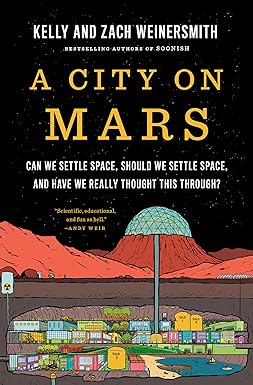
I enjoy reading Saturday Morning Breakfast Cereal, Zach Weinersmith's online comic. He also illustrated Bryan Caplan's book Open Borders, his defense of, well, open borders. And I also liked Soonish, Zach's 2017 collaboration with his wife, Kelly, on possible future technologies.
And so this was a must-read too. Another Zach/Kelly effort. And, although they don't mention it, it might just solve the Fermi Paradox: where are all the intelligent aliens that should have visited us by now?
Reader, it could be that their species had their own Zach/Kelly writers point out that space is an incredibly hostile environment, it's extremely difficult to exploit for riches, self-sufficient settlements are problematic, mere curiosity isn't an adequate excuse for the massive expense involved, and … well, there are a lot of downsides. Or (alternative explanation) the aliens might have, accidentally or on purpose, sent a local asteroid crashing into their home planet.
I know, all that's kind of a downer, especially if you (like me, and also like Zach and Kelly) have been caught up in the romance and excitement of exploring and living on other worlds. But they have done their homework. The technical issues are explored, areas of our ignorance (there are a lot of those) are revealed, and it's all pretty interesting. Even the poisonous Martian dirt.
The only weak spot in the book for me was their lengthy discussion of the legalities involved in space colonization. The authors look at existing treaties governing the use of outer space, and also (sorta) analogous situations on Earth (seabed mining, Antarctica). This seems to work against everything else in the book: space is way different, and I'd think it would require way different legal and political arrangements. There's an entire chapter, for example, on "company towns", and how they might work on the Moon or Mars.
Reader, company towns are pretty much over on Earth; the problems they were designed to solve were solved, and we've moved on. And lunar/Martian "towns" wouldn't look like that anyway.
Also Zach and Kelly aren't the least bit skeptical about involving the United Nations in coming up with treaties and governance. One look at the membership of the UN Human Rights Council, which includes Russia, China, Saudi Arabia, Venezuela, … might argue that a different approach might be called for.
That aside, though, the book is thorough and accessible. And full of humorous asides. And some PG-13 speculation on, um, reproductive issues in space. Not at all titillating, because once you work out the, um, kinks of the procreative act, things we don't know about space obstetrics would fill an even bigger book than this one.
![[The Blogger]](/ps/images/barred.jpg)



